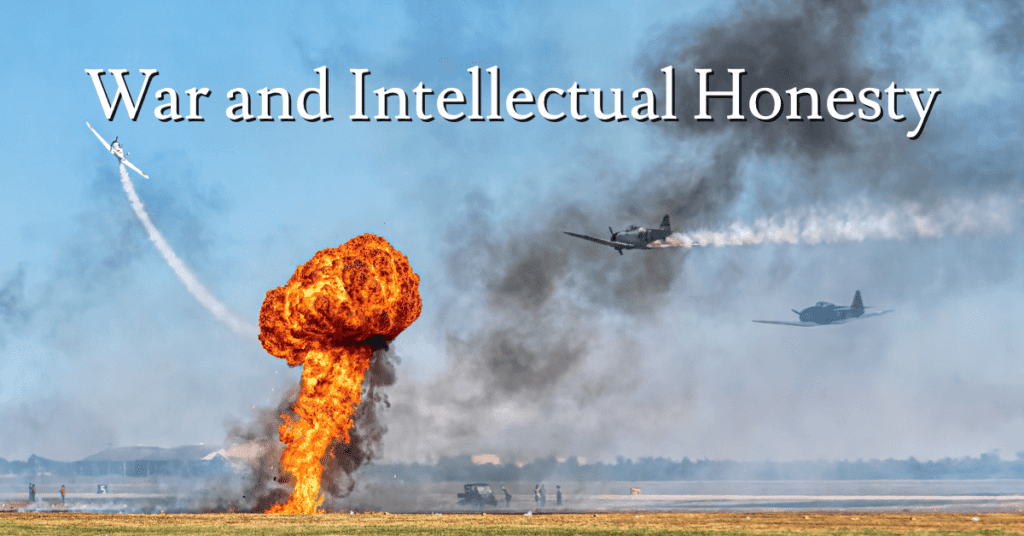Table of Contents
In general, maintaining intellectual honesty is a real challenge in life. When faced with a security situation like the one Israel’s been in for three months, where there are two distinct sides, neither of which wishes to give an inch of the benefit of the doubt to the other side, intellectual honesty becomes downright nearly impossible.
And it gets worse when you factor in this ridiculous modern algorithm-driven life we all live, where Facebook and YouTube continuously spit back at us content that merely supports what we’re already thinking, and couldn’t care less about such things as values, morality, and truth.
Bias and Intellectual Honesty

No one is immune to bias, despite how much they might think they are the exception. And no one could avoid a certain level of blind support for their “team”, despite desperately wishing to be objective.
But living an existence where truth is more important than being a dumb cheerleader is a value of mine, one I hope to pursue the remainder of my life. So despite having my biases, I can’t and will not shut off my brain, even if it means the occasional criticism of my own side of the debate.
Let’s get my bias out of the way first:
Israel is the good guy and Hamas is the bad guy. Is Israel perfect? By no means. But a sovereign nation that does not seek out conflict and wishes to protect its citizens will always be better in my eyes than a terrorist organization that rapes women, murders babies, and uses innocent people as human shields.
And that’s not really something I’m so willing to debate.
But bias should not mean a complete shutting off all faculties of reason. It should not mean blindly accepting everything I read or see on Twitter or someone shouts at me on a bus. It should not mean running from intellectual honesty.
Bias should just mean you’ve chosen a side. And it is harder to see faults on your own side. Not impossible. Just harder.
Bias should just mean you've chosen a side. And it is harder to see faults on your own side. Not impossible. Just harder. Share on XMore Than One Reality

So I read the news and see people’s repetitive posts on Facebook, and I often find myself wondering: Is this actually true? Or: Despite the initial exciting appearance, is this actually something I should be proud of or excited about?
And of course: Are we truly being honest with ourselves about the intellectual integrity of what we’re saying?
This is just one example of something I’ve encountered a number of times that I can’t help ponder.
One argument I frequently see: When Israel fights in Gaza, there should be minimal concern for “ordinary citizens” because there are no real innocent civilians. Why? Because they’re trained from an early age to want Jews dead and to do everything in their power to make that happen, and they did everything from cheer on Hamas’ actions on October 7th to direct complicit actions.
Another argument I’ve seen: Israel is thoroughly justified in any actions taken in Gaza because evidence shows even the Palestinians don’t want Hamas as their leaders. Their brutal and overbearing regime is bad for the average Gazan on the street, and they want Hamas to be overthrown as much as we do.
Both approaches alone have their merit. And the possibility of being logically accurate.
However, can they both be true? Are these two ideas ever posted and or cheered on by the same source? Can they co-exist or are we just blindly regurgitating any argument we find appealing just because our crazy neighbor posted it on Instagram with a quip and an authoritative tone?
Contradictions

I maintain they are contradictory. You can tell me the average person on the street is not entirely innocent. You can talk about the text books in their schools. You can show videos galore of women and children cheering rape and murder. And the anger this induces could absolutely cause you to boil in rage. Even violent rage.
But don’t go trying to say the next day that the poor innocent Gazan hates Hamas as much as we do. Don’t go saying we’re really all on the same side against a common enemy.
I just don’t see a reality in which these two concepts can coexist. In which both can be accurate. In order to be intellectually honest, you also need to be logically consistent. And if you find it perfectly acceptable to be inconsistent, just quoting arguments when they suit your needs, you are no longer being true to the world or yourself. You are a propagandist. You’re just trying to manipulate facts to support whatever point you wish to make at any given moment.
The Believer

I think back to the movie The Believer, a fantastic film that I feel most have forgotten exists, about a Jewish boy who becomes a neo-Nazi when he learns about Jewish passivity during the Holocaust. He comes to think of his own people as weak and it sets him on a dangerous path.
Many hypocritical and contradictory thoughts are expressed and exposed throughout the film.
My favorite is when one of the Nazis is harassing a Jew in a restaurant, and in the dialogue one of the group denies Hitler’s murder of six million Jews. One of the others shouts at him, “Of course he killed six million Jews. That’s why he’s your hero, you moron.”
This fool was doing exactly as I’m arguing against. When he needed Hitler to be the leader of those who truly hate the Jews, Hitler was the mastermind exterminator. But when he needed to argue that Jews didn’t have the right to their level of anger, he made Hitler into someone who’s actions had been exaggerated.
But only one reality could be true, and his friend called him out on his asinine misuse of logic.
The Need for Consistency

We see it when other people do it. Everyone loves to point out a flaw in arguments made by others. But it takes a lot more work to see it in our own arguments. It takes a lot more work to consistently maintain intellectual honesty.
And I think we need to be people who do that. 100% of the time.
We can’t afford not to.
The world is looking at us. They’re pouring over our every word and action with a fine-tooth comb. And we must do a better job than we’re doing.
And we shouldn’t have to manipulate facts or stretch the truth. We occupy the moral high ground. We’re not perfect, but we sure as hell are better than the monsters who kidnapped and murdered babies on October 7th.
We’ve got the truth on our side. We should use it.



